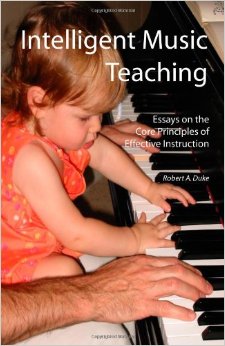I am excited to post this book review because this is one of the best books I have read in a while. If you are looking for a practical yet research-based book about piano/music pedagogy, get your hands on this book. This is my best book recommendation for any music teacher looking to improve their teaching.
Intelligent Music Teaching: Essays on the Core Principles of Effective Instruction, by Robert A. Duke

The author, Robert Duke, is currently Professor of Music and Human Learning at the University of Texas at Austin. According to his bio, his research on human learning and behavior includes studying motor skill learning, cognitive psychology, and neuroscience. He is also a former studio musician and public school music teacher.
Robert Duke’s book is organized into eight chapters or essays, with titles such as “Precision in Language and Thought,” “Sequencing Instruction,” “Feedback, and “Effecting Change.”
In the first chapter, the author makes a point about the ability to speak/write with precision of language being an important asset for any teacher. Based on the wonderfully clear writing is this book, I imagine that the author is an excellent teacher.
The book discusses how to think of the every day components of our teaching — instruction, assessment, evaluation, sequencing, etc. — with an awareness of how the human mind works and learns. Every page of this book contains a nugget of wisdom or practical tip for how to teach intelligently and meaningfully so that our students learn how to change and improve themselves.
Allow me to give you one quick example of a meaningful take-away from the book. During a section where the author makes a comparison to learning how to solve quadratic equations in math, he states: “The goal of instruction — the real goal, the long-term, far-reaching goal — is not to solve the equations, but to use what you know about solving equations to solve other problems that you may or may not have encountered before” (p. 29). Music teachers should have a similar instructional goal, as the author expounds throughout the book. The goal is for the student to gain intellectual, physical, or social skill rather than merely knowledge.
The writing is pleasant to read, being both intelligent and conversational. I think it is rare to find a book with such well-grounded information that is understandable by the layperson. The teaching/learning strategies and principles discussed in this book are backed by research. Yet, reading this book felt like having a thought-provoking conversation with the author over coffee. I could hardly put the book down until I finished reading it.
I highly recommend this book to any music teacher. It is a must-read for newbie and experienced teachers alike. My opinion is that it should be required reading in every piano pedagogy class. It will influence and change the way you teach. View it on Amazon here.
Edit: Ohio University sponsors a piano pedagogy seminar each summer in June and this year (2015), they have invited Robert Duke to be a speaker. I read Dr. Duke’s book in anticipation of attending this event. For more information about the event, visit oupianopedagogyseminar.com.



Great review, Joy! This is a very helpful book and I love that it is applicable to all kinds of music teachers, not just piano teachers. My husband, who teaches elementary general music, wouldn’t let me take this book to my studio, he wanted it kept at home so he could read it too!
i heard the author speak at a conference and immediately bought the book. Great perspectives in the book. I agree that it should be required reading.
Thanks for the recommendation–I will buy it right now! Sounds really useful and interesting.
Thanks for sharing this book and quote, Joy!
“The goal of instruction — the real goal, the long-term, far-reaching goal — is not to solve the equations, but to use what you know about solving equations to solve other problems that you may or may not have encountered before” (p. 29).
This will really make me re-think how I will teach my students.
1 31 I HOPE I HAVE THE RIGHT ROBERT A DIUKE I WANTED TO CONGRATULATE YOU ON THE COMMENT TO THE VIEW I DO IT EVERY DAY HOW RUDE THEY WERE TO ALAN DERSKOWITZ I WAS SO MAD I SENT A COMMENT TO ALAN ABOUT IT I TRY TO FIND YOU ON F B SO MI COULD SEND THIS THANKS AGAIN I HOPE I HAVE THE RIGHT PERSON MARYANN